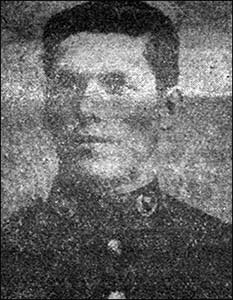The Rushden Echo, 3rd December 1915, transcribed by Gill Hollis
The Lusitania Outrage
Rushden Man’s Work in Rescuing the Survivors
Heart Broken Mothers Crying for their Children
Pte. Walter Mole Wounded
Private Walter Mole (Rushden), of the Royal Marine Light Infantry, son of Mrs. Arthur Mole, of Thrift Cottages, Wellingborough-road, Rushden, has been on active service since the commencement of the war, and is now, spending 21 days’ leave at home after having been once wounded. He has been nearly five years in the service of his Majesty.
Interviewed by a representative of the “Rushden Echo” he said:-
 |
|
Walter Mole In WWI
|
“Since the commencement of the war I have travelled approximately 70,000 miles. Until last May the cruiser upon which I am stationed was engaged in patrol and escort work and I had plenty of excitement during that time. On the day the Lusitania was sunk we were patrolling in that vicinity, and we had signalled her at noon when she reported ‘All’s well.’ Very shortly afterwards we received the news that she had been torpedoed, and the Admiral at once ordered full speed ahead, and we proceeded towards where she was. Before the cruiser had fairly got into her stride we received the appalling news that the Lusitania had gone under. We were quickly surrounded by tugs bearing survivors and we escorted them into Queenstown harbour. Many of the poor creatures were in a pitiable state with scarcely any clothing, and we supplied them with blankets, and any warm clothing we could. After arriving in harbour we assisted the survivors to the various places of refuge that had been placed at their disposal.
“It was such a pitiable sight that I shall never forget it. Many of the poor people had temporarily lost their reason, and it was heart-breaking to hear the mothers crying for their children.
“All our chaps, as well as the seamen, were literally boiling over with rage and we would have given anything to get one back at the German cowards.
“Since that time I have had some experience in the Persian Gulf, and it was there that I got wounded. As we were landing a party, the tribesmen who reside on the coast, and who were backed up by Turkish officers, directed a heavy fire at us from pom-poms and rifles. We caught it pretty hot, several of our chaps being killed. As for myself, I received two bullet wounds, one through the third finger of the right hand and the other through the wrist. The latter wound was by far the worst, and I think the bullet must have been of the explosive variety as it smashed my arm from the wrist to the elbow. I was taken back to the ship, and after three days aboard I was sent up the Shutelarab River to Basra hospital where I remained for just over a week. Then I was sent on a hospital ship to Bombay, the voyage taking us about six days. I was kept in hospital at Bombay for a month, and then I was again put on to a hospital ship and conveyed to Suez via Aden.
“At Suez we transhipped and went by train to Alexandria. After four days there I embarked for England and arrived at Southampton on November 7th. I was sent to Lenfered Hasler hospital and after being there a week I was sent to headquarters. I attended hospital in barracks for a little more than a week and was then given leave and preceded home, and jolly glad I am to see my mother again.
“The people in England don’t appear to realize half the hardships that British troops, engaged in the Mesopotamia campaign, have to put up with. The heat is simply wicked, the temperature always being over 120 degrees. The flies and mosquitoes pretty well eat you alive, and it is perfect torment. I have read P. W. Long’s letters in the “Rushden Echo,” and what he has said is absolutely correct. I know him very well, but never had the luck to run across him out there. I should have liked to meet him but didn’t get the chance. Until I saw Long’s letters I thought I was the only Rushden fellow out there.”
Pte. Mole has kept both bullets that wounded him as souvenirs. The bullet that struck him in the hand subsequently embedded itself in the oar he was pulling. Pte. Mole has an X-ray photograph, showing the bullet embedded in his arm.
|